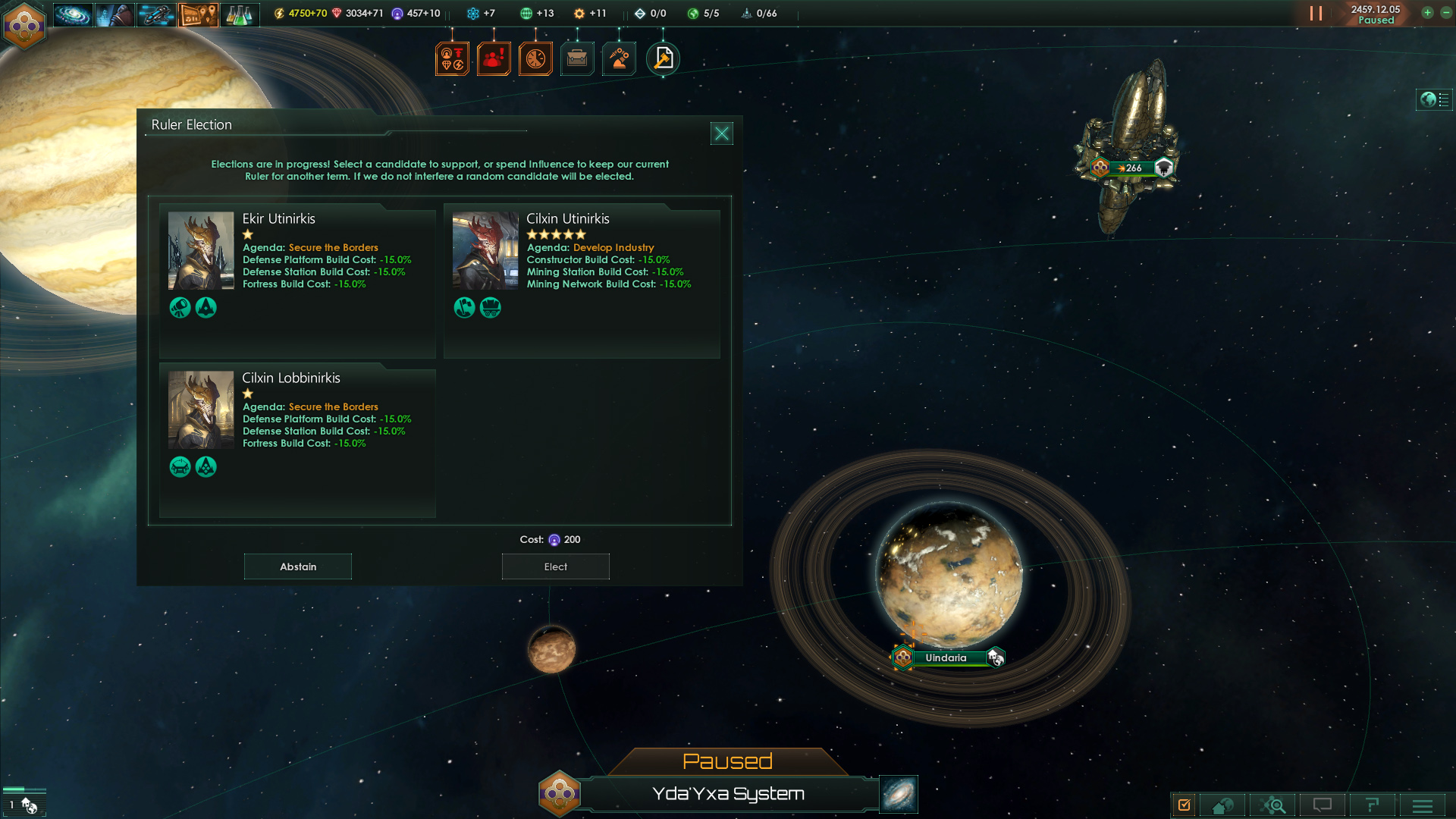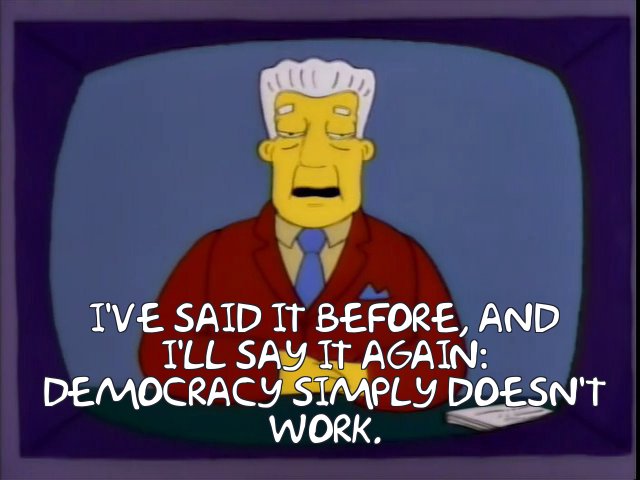Greetings fellow Spacers!
Today’s dev diary is about Pop Factions and Elections, which might sound like two wildly different topics, but they actually have some common ground. Let’s start with the Pop Factions. Now, as you know, each individual unit of population (a.k.a. “Pop”), has its own race, ethos and possibly even genetic differences compared to its species of origin. People who live far from the capital world of an empire - especially those who live in Administrative Sectors - tend to diverge in their Ethics over time. When you combine this with alien immigration and the conquest of alien worlds, you will soon have to deal with a potentially explosive mix of cultural diversity. As your empire grows, it will get harder and harder to keep everyone happy and your core group of loyalists might eventually find itself a minority. Discontent can manifest in two ways; the happiness of an individual Pop, and the growth of “Factions”, a type of political movement.

Unhappy Pops will tend to join or start the most appropriate Faction, depending on the reasons for their discontent. The most basic (and probably most dangerous) type of Faction is the Separatists, who desire independence. There are actually three Separatist variations; some want freedom for a single planet, some want their Sector to secede, and some are integrated aliens who seek the restoration of their lost empire. Another important Faction is the Democracy Faction, whose member Pops might prefer a change of Government Form, or just the right to vote (for example in the case of alien Pops who are denied the vote through a Policy.) There are other Factions as well, but one thing they all have in common is that you can actually deal with them before things get violent. This is an important use for Influence (and sometimes Energy Credits.) For example, you could bribe the Faction leader to prevent a revolt for a time, or you could grant a Separatist Faction limited independence as a vassal state. There are different potential actions depending on which type of Faction it is.
This brings us to Elections and how they tie into the overall scheme. All of the Democratic Government Forms in the game have Elections, though the terms might vary. One difference between the various forms of democracy is which leader characters are the most valid and supported candidates for the chief executive office. In a Military Republic, for example, your Admirals and Generals tend to win the elections. However, all of the Faction leaders are also valid candidates; even the ones who seek independence for their species. If a Faction leader wins an election, that does not mean that their demands are immediately met, however. Instead, what happens is that the Faction becomes passive and will not revolt, which is great for you. Unfortunately, it also increases the attraction of the Faction, which means that it is likely to get far more member Pops…

Does the player have any direct control over Election outcomes? Yes, you can spend Influence in order to campaign for the candidate of your choice, but it’s not a sure thing, and the cost can be prohibitive if the candidate enjoys little popular support.
The main point of the Faction system is that big empires should become unstable and challenging to keep together. You should see a lot of dynamism in the galaxy, with many big empires descending into civil wars and breaking up. Of course, a lot of this depends on your choice of Ethics and general play style (using slavery and purges, etc), which trades internal stability for increased external pressure…
That’s all for now folks! Stay tuned for next week...
Today’s dev diary is about Pop Factions and Elections, which might sound like two wildly different topics, but they actually have some common ground. Let’s start with the Pop Factions. Now, as you know, each individual unit of population (a.k.a. “Pop”), has its own race, ethos and possibly even genetic differences compared to its species of origin. People who live far from the capital world of an empire - especially those who live in Administrative Sectors - tend to diverge in their Ethics over time. When you combine this with alien immigration and the conquest of alien worlds, you will soon have to deal with a potentially explosive mix of cultural diversity. As your empire grows, it will get harder and harder to keep everyone happy and your core group of loyalists might eventually find itself a minority. Discontent can manifest in two ways; the happiness of an individual Pop, and the growth of “Factions”, a type of political movement.

Unhappy Pops will tend to join or start the most appropriate Faction, depending on the reasons for their discontent. The most basic (and probably most dangerous) type of Faction is the Separatists, who desire independence. There are actually three Separatist variations; some want freedom for a single planet, some want their Sector to secede, and some are integrated aliens who seek the restoration of their lost empire. Another important Faction is the Democracy Faction, whose member Pops might prefer a change of Government Form, or just the right to vote (for example in the case of alien Pops who are denied the vote through a Policy.) There are other Factions as well, but one thing they all have in common is that you can actually deal with them before things get violent. This is an important use for Influence (and sometimes Energy Credits.) For example, you could bribe the Faction leader to prevent a revolt for a time, or you could grant a Separatist Faction limited independence as a vassal state. There are different potential actions depending on which type of Faction it is.
This brings us to Elections and how they tie into the overall scheme. All of the Democratic Government Forms in the game have Elections, though the terms might vary. One difference between the various forms of democracy is which leader characters are the most valid and supported candidates for the chief executive office. In a Military Republic, for example, your Admirals and Generals tend to win the elections. However, all of the Faction leaders are also valid candidates; even the ones who seek independence for their species. If a Faction leader wins an election, that does not mean that their demands are immediately met, however. Instead, what happens is that the Faction becomes passive and will not revolt, which is great for you. Unfortunately, it also increases the attraction of the Faction, which means that it is likely to get far more member Pops…

Does the player have any direct control over Election outcomes? Yes, you can spend Influence in order to campaign for the candidate of your choice, but it’s not a sure thing, and the cost can be prohibitive if the candidate enjoys little popular support.
The main point of the Faction system is that big empires should become unstable and challenging to keep together. You should see a lot of dynamism in the galaxy, with many big empires descending into civil wars and breaking up. Of course, a lot of this depends on your choice of Ethics and general play style (using slavery and purges, etc), which trades internal stability for increased external pressure…
That’s all for now folks! Stay tuned for next week...


